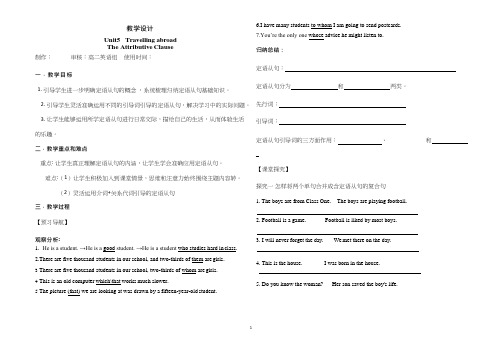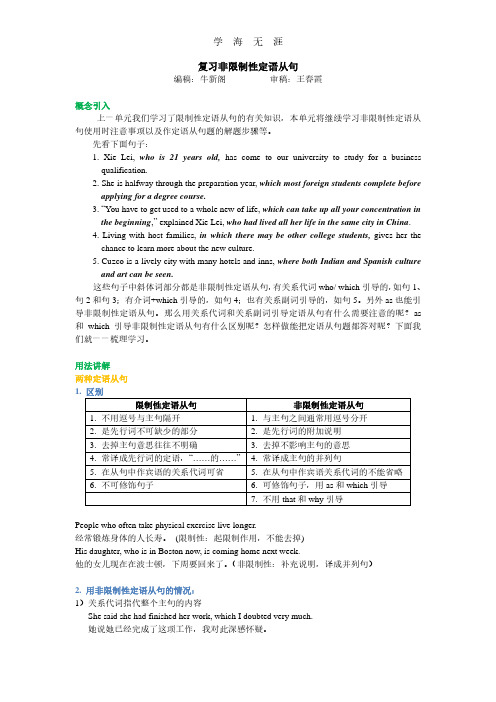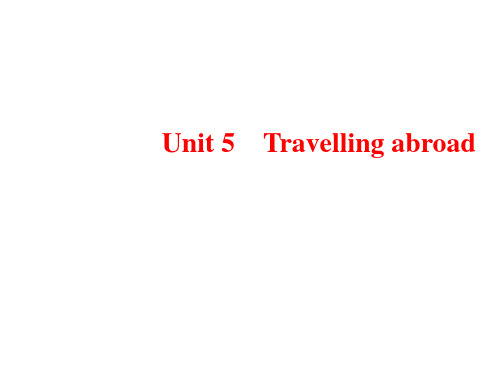Unit 5 Travelling abroad非限制性定语从句(教师版)
- 格式:doc
- 大小:53.50 KB
- 文档页数:5


教学设计Unit5 Travelling abroadThe Attributive Clause制作:审核:高二英语组使用时间:一.教学目标1.引导学生进一步明确定语从句的概念,系统梳理归纳定语从句基础知识。
2.引导学生灵活准确运用不同的引导词引导的定语从句,解决学习中的实际问题。
3.让学生能够运用所学定语从句进行日常交际,描绘自己的生活,从而体验生活的乐趣。
二.教学重点和难点重点: 让学生真正理解定语从句的内涵,让学生学会准确应用定语从句。
难点:(1)让学生积极加入到课堂情景,思维和注意力始终围绕主题内容转。
(2)灵活运用介词+关系代词引导的定语从句三.教学过程【预习导航】观察分析:6.I have many students to whom I am going to send postcards.7.You’re the only one whose advice he might listen to.归纳总结:定语从句:定语从句分为和两类。
先行词:引导词:定语从句引导词的三方面作用:、和_【课堂探究】探究一怎样将两个单句合并成含定语从句的复合句1.The boys are from Class One. The boys are playing football.2.Football is a game. Football is liked by most boys.3.I will never forget the day. We met there on the day.1.He is a student. →He is a good student. →He is a student who studies hard in class.2.T here are five thousand students in our school, and two-thirds of them are girls.4. This is the house. I was born in the house.3.T here are five thousand students in our school, two-thirds of whom are girls.4.T his is an old computer which\that works much slower.5.T he picture (that) we are looking at was drawn by a fifteen-year-old student.5. Do you know the woman? Her son saved the boy's life.归纳总结:1)同指,即找出两句中指代同一事物的或,并根据意思确定哪一句变为定语从句。

复习非限制性定语从句编稿:牛新阁审稿:王春霞概念引入上一单元我们学习了限制性定语从句的有关知识,本单元将继续学习非限制性定语从句使用时注意事项以及作定语从句题的解题步骤等。
先看下面句子:1. Xie Lei, who is 21 years old,has come to our university to study for a businessqualification.2. She is halfway through the preparation year, which most foreign students complete beforeapplying for a degree course.3. “You have to get used to a whole new of life, which can take up all your concentration inthe beginning,” explained Xie Lei, who had lived all her life in the same city in China.4. Living with host families, in which there may be other college students,gives her thechance to learn more about the new culture.5. Cuzco is a lively city with many hotels and inns, where both Indian and Spanish cultureand art can be seen.这些句子中斜体词部分都是非限制性定语从句,有关系代词who/ which引导的,如句1、句2和句3;有介词+which引导的,如句4;也有关系副词引导的,如句5。

Unit 5 Travelling abroad语法探究I.非限制性定语从句的使用场合(1)先行词为独一无二的物体时The sun, which rises in the east, gives us light and heat.太阳从东边升起,给我们光和热。
(2)先行词是指物的专有名词时The Great Wall, which is called in Chinese “The Ten-Thousand Li Great Wall.”, is actually more than 6,000 kilometers.长城,中国人称作“万里长城“实际有6000多公里。
(3)先行词指物而且被指示代词或人称代词修饰时。
This is her house, which was built last year.这是他的房子,去年建的。
(4)定语从句修饰整个主句时He is from America, which I know from his accent.他是美国人,这一点我是从他的口音的只得。
II.非限制性定语从句引导词的选择(1).关系代词的选择非限制性定语从句的关系代词不能用that。
指人时,如果引导词作主语,用who; 作宾语用whom,指物时,用which。
引导词作宾语也不能省略。
Mr.Zhang, who came to see me yesterday, is an old friend of my father’s.张先生昨天来看我,他是我父亲的一位好朋友。
Miss Howe, whom you me t at the station, is f rom America.豪小姐是美国人,你在车站见过她。
The Great Wall of China, which was built by Chinese ancient people, is regarded as one of the few wonders of the world.长城是中国古代人民修建的,它被看作是世界上少有的奇迹之一。


人教版选修7Unit5Travelling Abroad Period4 非限制性定语从句(学案)Step Ⅱ、Practice一.用who, whom, which, whose, as, when, where 填空:1. Who moved my Cheese?, _______ is a best seller, is written by Spencer Johnson.2. The doctor was impolite to his patient, ____ made things even worse.3. He was eager to go to the hospital to see his stepmother, ______ he loved and respected as his own mother.4. Mr. Smith, ______ foot was badly hurt, was quickly sent to the local hospital.5. After Graduation, I decided to stay in Chongqing,______ I spent my childhood and four years of college life.6. Albert Einstein left Germany for the United States during World War II, ____ Jews were badly treated in Germany.二.改错1. The book, that he lost yesterday, has been found.2. Peter, who you met in London, is now back in Paris.3. By 16:30, when was almost closing time, nearly all the paintings had been sold.4. People are excited to meet Zhai Zhigang, he was the first Chinese to walk in space.5. Which is shown on TV, many children suffered a lot from the polluted milk.Step III. Difficult points1.as 和which引导的非限制性定语从句Practice1). The weather turned out to be terrible, ______ was out ofexpectation.2). He said that he had never seen her before, _____ was not true.3).A lot of language learning, _____ has been discovered, ishappening in the first year of life, so parents should talk much to their children during that period.2.分隔式定语从句1)She went to the United States in 1998, ___, four years later, she got a leading role.2)Mr. White worked until seven o’clock in the office, ____ most of his colleagues went home.3. 介词+关系代词引导的非限制性定语从句1) Our class consists of 62 students, 46 of ______ are girls.2) There are forty students in the classroom, all of ____ are working hard at a math problem.3) There are many books on the table, some of _____ are Professor Black’s.4) My uncle gave me ten books, three of ________ were written by Yang Jiang.Step IV. Writing1.What would you like to do during summer vacation ?I would like to do a part time job, which will help me…(锻炼自己,赚钱)(Picture1)I would like to…, which will…(Picture2)I would like to…, which will…(Picture3)2.What would you like to do during the vacation ?1) catch up on sleep; help to refresh myself (which) (Picture1)2)get together with my friends; interesting and exciting (which) (Picture2)3)go to Xia Men, enjoy the beach and sunshine (where) (Picture3) StepV. Homework :Write a composition: My Plan for My Vacation。
BOOK7 Unit5 Travelling abroad目标认知重点词汇:board, qualification, recommend, substitute, acknowledge, occupy,keep up, fit in, get used to, take up, as far as one is concerned,out of the question重点句型:强调句型语法:非限制性定语从句重点词汇1.board【原句回放】Six months ago Xie Lei said goodbye to her family and friends in China and boarded a plane for London. (P38)【点拨】board v.登上(船,机动车或飞机等);寄宿,供应膳食【拓展】board用作名词,表示“木板;膳宿费;委员会;理事会”。
常用短语:on board在火车(轮船、飞机)上2.qualification【原句回放】Xie Lei, who is 21 years old, has come to our university to complete a business qualification. (P38)【点拨】qualification n. “资格,执照”,可以是可数名词,也可以是不可数名词。
常用短语:admission qualification 入学资格without qualification 无条件地a doctor’s qualification 当医生的资格【拓展】qualify vt., vi.表示“(使)合格;(使)具有资格”,经常与for连用。
3.recommend【原句回放】Xie Lei highly recommends the course. “The preparation course is most beneficial,”she said. (P38)【点拨】recommend vt.“推荐,推举”,如:【拓展1】recommend也表示“劝告;忠告”,与advise用法相似。
B7U5 Grammar:复习定语从句之非限制性定语从句一、读下列课文中的句子,找出非限制性定语从句。
1.Xie Lei,who is 21 years old,has come to our university to study for a business qualification.2.She is halfway through the preparation year,which most foreign students complete before applying for a degree course.3.Living with host families,in which there may be other college students,gives her the chance to learn more about the new culture.概念归纳:非限制性定语从句在意义上只是一个附加修饰语,对先行词或主句作些附加的说明。
如果去掉,主句的意思仍然完整。
译成汉语时,从句常单独译成一句话,书写时往往用逗号与先行词分开。
练习:1). His father, who works in Beijing, came back yesterday.2).Xi’an, which I visited last year, is a nice old city.3).The novel is very interesting, which made me very glad.4).As we all know, Beijing is the capital of China.5). His wife, whomyou met at my home, was a teacher.二、非限制性定语从句的引导词:引导非限制性定语从句的关系词有: 关系代词(作主/宾/定语)、关系副词(做状语), 其用法列表如下:注意:非限制性定语从句也可以由“介词+关系代词”引导,当先行词指人,介词提前的结构是:介词+whom;当先行词指物,介词提前的结构是:介词+which。
Eg:1)Many people, some of whom are not overweight, are going on diets.2)They talked about a movie,the name of whichI've never forgotten.练习:用关系代词或关系副词填空。
1.China, which was founded in 1949, is becoming more and more powerful.2. He has to work on Sundays, which he doesn’t like.3.His mother, who loves him very much, is strict with him.4.Sun Yida, whom everyone likes very much, is one of the best athletes in our class.5. Angles, whose native language is German, can read and write in several foreign languages.6. They went to London,where they lived for six months.7. He will put off the picnic until May 1st, when he will be free.8. I had told my teacher the reason, for which_ I was late today.9.There are 54 students in my class, three of whom come from the US.10.I am doing different types of exercises, all of which are quite helpful to myhealth.三、限制性定语从句与非限制性定语从句的区别。
比较并试着省略定语从句分析结果:1)The building _________ stands near the river is our school . which/thatHe pretended not to know me, ______ I found quite strange.which2)Please tell me the reason _________he looks unhappy. why/for whichI had told them the reason , _________ I didn't attend the meeting.for which3)The town where I live is beautiful.我居住的小镇很漂亮。
(去掉从句,句意不完整) Huazhou,where I live,is beautiful.化州非常漂亮,我在那居住。
(去掉从句,句意完整)练习:1)This is the house _______we bought last month. that/which2)The reason he didn't come in time was that he didn't feel well. why3)Charles Smith , _____ was my former teacher, retired last year. who4)After the war he went to the America, _______ he found a job. where5)The weather truned out to be very good, __________ was more than we could expect. which6)His wife, ______ is at my home, is a teacher. who四.关系代词which与as引导非限制性定语从句的区别。
1. 位置不同:当先行词为整个句子时,可用as或which引导,常用逗号分开,as引导的非限制性从句可置于主句之前或后,which引导的非限制性从句只能位于主句之后。
练习:1). Air, ____ weall know, is gas. as2). ______ is known to us all, we should be equal before laws. As3)China is a large country, _________is known to us all. which/as4) He failed in the exam, ________ made him lose heart.which2. 指代不同:当定语从句位于主句后面,指代主句所述的内容,根据要表达的意思,用which 或as,如果从句和主句语义一致时用as,反之则用which。
但当指代是主句的一部分时,只能用which,而不用as。
1) He seems not to have made sense of what I meant, ________ greatly upset me. which 2)Mary was admitted to the university, _________ might be expected. as3) He heard a terrible noise, ________ brought her heart into her mouth. which 3. 意义不同:从意义上讲,which 意为“这一点’, 而as 却可表示“正如...那样”,as 常用于固定搭配中,如:as we all know/as is known to allas you say/as I can see/ as is reported, as you may have heard/ as we expected…1). ____________________, China is a developing country.众所周知,中国是一个发展中国家。
(正如)As we all know/As is known to all2). He kept silent all night, which was surprising. (这)3)Alice received an invitation from her boss, _______ came as a surprise. which4)_______ is reported in the newspapers, talks between the two countries are making progress. As五、区别定语从句与名词性从句。
请划出下面的从句并判断是什么从句。
1)a. He did all (that) he could to help me.(定语从句)b. He did what he could to help me.(宾语从句)3)a. As is known to us all, the earth turns round the sun. (定语从句)b. It is known to us all that the earth turns round the sun. (主语从句)4)a.The news that our volleyball team won the match made us excited.(同位语从句)b. The news (that/which) he told me yesterday is exciting. (定语从句)区别归纳:1、有先行词的是定语从句;2、what、how、whether、if不用于引导定语从句;3.that在定语从句中担任成分,指代先行词,且作宾语时可省略。
但在名词性从句中,不充当成分,不可省略。
练习:1)All that can be done has been done. (定语从句)2) What can be done has been done.(主语从句)3) We all have heard the news_____ our team won. that(同位语从句)4) We don’t believe the news _________ he told us yesterday. that/whcih(定语从句)5)The place ____ the bridge is supposed to be built should be_____ the cross-river traffic is the heaviest. Where where(定语从句)(表语从句)六:区别定语从句与强调句型。